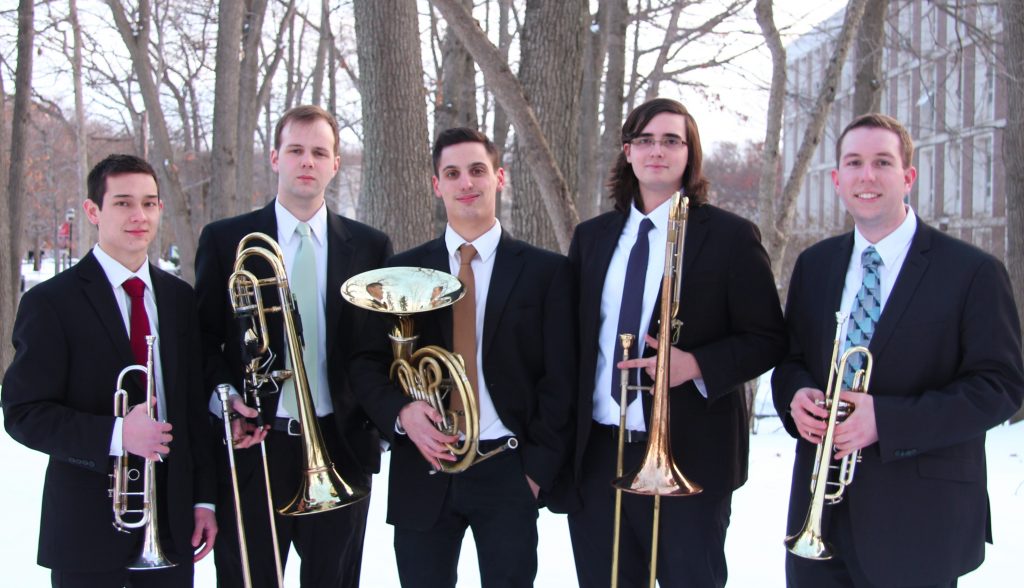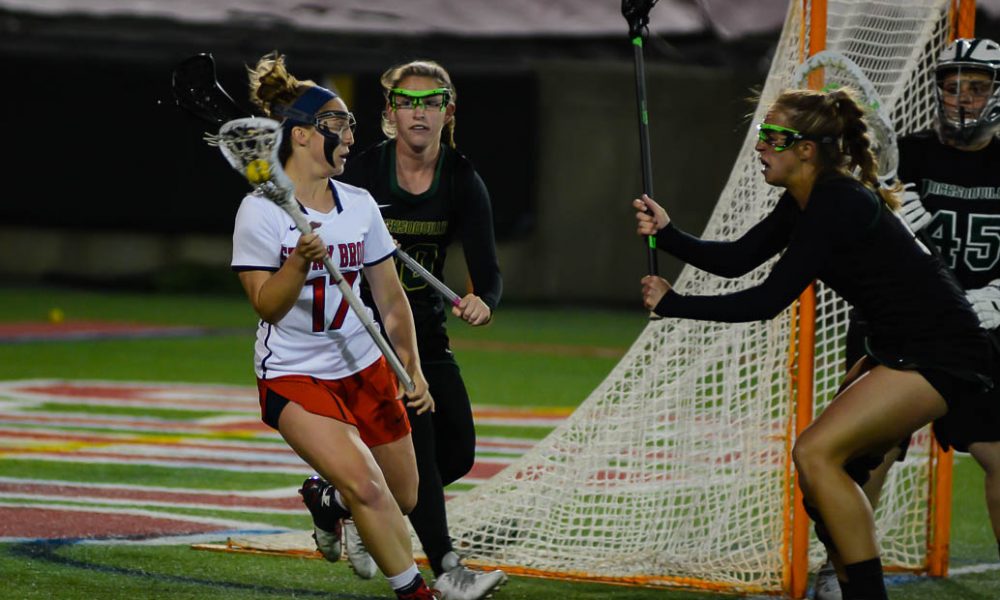I drove with my daughter to the historic Emma S. Clark Memorial Library in Setauket to listen to a brass quintet play on April 24. It was a beautiful spring day for an excursion, made all the better by the anticipation of hearing classical music: few things are more uplifting. I had some reservations about the free concert given by students from Stony Brook University. Would these young musicians be as polished as professionals? Or more akin to the sometimes-rough-around-the-edges high school performances I had smiled through as my children grew?
The performance space was the library’s periodical reading room in the original 1892 Tudor-style building. It was a perfect venue to hear classical music. The vaulted beamed ceiling set the stage magnificently with the wooden staircase winding up to a loft and stained glass windows including a large one of the angel Gabriel. We sat on a pair of plastic chairs as the scattering of comfortable leather armchairs were already taken. Many in the audience were elderly, as one might expect for a classical concert. Some were family members or friends of the performers. People were dressed casually, just locals enjoying a Sunday afternoon in their community, not at all like the formal atmosphere in Carnegie Hall. The room filled, more chairs were hastily brought in and the crowd spilled into the room beyond.
Anima Brass, the brass quintet, entered in suits and ties. All five were young men, which did not surprise me given my own experiences playing baritone horn in my youth. There were two trumpeters, John-Thomas Burson and Thomas Pang, Austin Sposato on French horn, Michael Lockwood on trombone, and Jeff Smith on bass trombone. The band set up quietly in a nook by the fireplace while a librarian introduced them, and without further ado, they began to play.
First in the set was Scherzo, a 1963 composition by John Cheetham, an energetic and complex piece that was reminiscent of a Wild West movie soundtrack. Following it came six brief chansons, or songs, by late-1400’s French composer Josquin des Prez, arranged for brass quintet by Raymund Mase. The songs ranged from somber, with long drawn-out notes, to joyful, with lively toots and sweet harmonies. I closed my eyes and it might have been 500 years ago. Next, the band performed Russian composer Victor Ewald’s Quintet #3, written circa 1912, a romantic piece in four movements. The five musicians were like fingers on a hand, working seamlessly together; each instrument a separate thread weaving a tapestry of sound, creating a whole far greater than merely the sum of its parts.
After a brief intermission, during which the performers spoke quietly with audience members of their acquaintance, the concert resumed with Three Pieces, written in the 1800’s by German composer Ludwig Maurer and edited by Rogert Nagel. Many in the audience closed their eyes as they listened, heads nodding in time with the rhythm, smiles on their faces.
Following that romantic selection came something wholly unexpected: the world premiere performance of a piece composed by a Stony Brook graduate student, Joe Sferra, seated beside me in the audience. Sferra was called upon to introduce his work, titled “Anima for Brass quintet”, which he had written specifically for Anima Brass. He described it as a piece with a “disembodied start” that “coalesces” and then “gradually falls apart.” I knew I was about to hear something very different.
The opening was disjointed. Each instrument seeming to pipe up almost randomly, which gave the listener the opportunity to hear the unique tone and character of each one individually: the playful slides and swoops of the trombones, the dulcet tone of the horn, the light toots of the trumpets. The sounds became cohesive and a jazzy melody emerged, only to fracture, with pregnant pauses keeping the audience off-balance. It was a fascinating glimpse at how classical instruments can be used in surprising ways to create something completely different from “classical music,” something that honors the style and form of its roots, but is innovative and free.
The final piece was a return to more traditional fare: German composer Oskar Bohme’s Sextet in E-flat minor, for which the quintet was joined by guest Lucas Balslov on trumpet. The additional trumpet made for a fuller, richer sound. The music built to a crescendo that filled the room, soaring to the vaulted ceiling. A final fanfare closed the concert, and Anima Brass bowed as we applauded.
As the audience drifted somewhat reluctantly into the modern addition to the library and the everyday world, I lingered a moment to thank the talented young musicians for a delightful afternoon. Anima Brass and other Stony Brook groups offer free performances throughout the community every weekend, and I am resolved to attend another. Music is food for the soul and I find myself hungry for more.




Comments are closed.